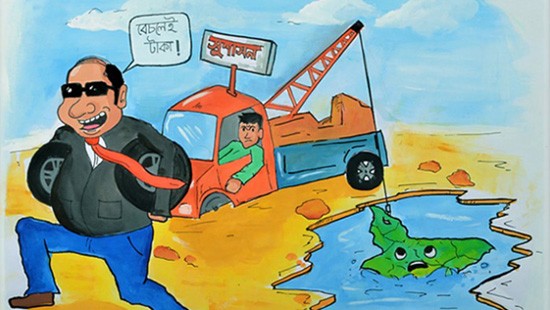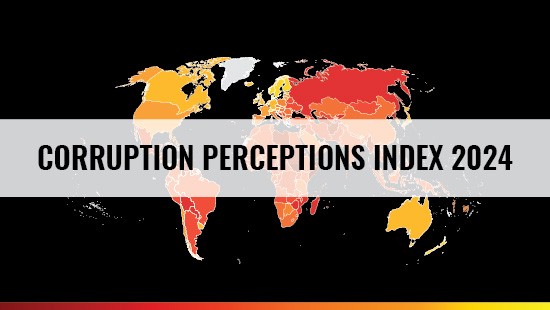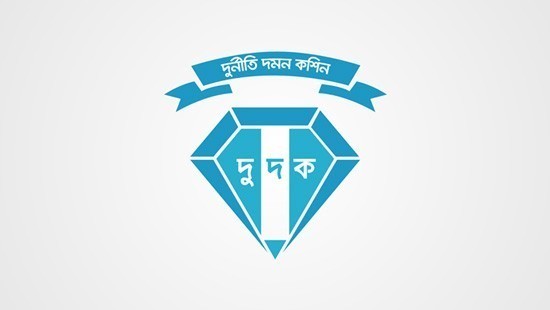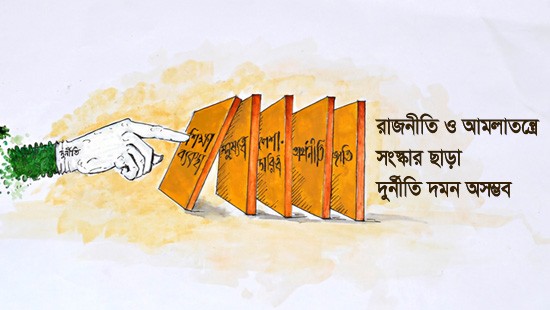Published: 07 August 2014
It is important to see the National Broadcast Policy approved in the cabinet meeting this week for what it is, and what it isn’t. Although sections of the media have been up in arms over the last few days decrying its potential as a force that can be used to suppress freedom of the press, it is important not to overstate its powers, given that it falls short of actual legislation and hence isn’t legally enforcable. In fact, what it does is set the groundwork for the formation of a Broadcast Commission, that will work to enact a Broadcast Act.
The important thing going ahead will be to see how the government chooses to form this commission. Ideally, it should be through an open and consultative process, as TIB head Dr Iftekharuzzaman sets out in his comments later. The approved policy itself is a bit ambiguous about this, only specifying it should be done ‘lawfully’. It is thought that the policy grants too many powers to the Information Ministry, that will be responsible for implementing it till the formation of the commission.
One of the chief drafters of the approved policy, working with the Information Ministry, was Shahab Enam Khan – chair of the International Relations department at Jahangirnagar University. Dhaka Courier had a chance to sit with him on the day after the cabinet’s approval, as the promised gazette notification within 48 hours was set to come out. Khan reassured us that we were the first in our profession to have the pleasure of viewing the final draft, but we’re sure some of our colleagues have heard the same from sources at the Information Ministry. Be that as it may, it was interesting to hear about the process that resulted in the policy, over which consultations had been held with different sections of society for quite some time. Nevertheless, it’s questionable how much of the consultations were actually taken on board in drafting the final document.
Khan informed us that corruption watchdog Transparency International Bangladesh, for example, suggested 11 changes to the final draft, all of which were incorporated. The association of television channel license owners, ATOC, suggested 7 changes, of which 5 were incorporated. Their principal headache centred the process to be set by the forthcoming commission on obtaining and renewing licenses for television/radio channels. Interestingly Monjurul Ahsan Bulbul, president of the larger faction of the divided Bangladesh Federal Union of Journalists – meant to represent journalists – did not attend a single one of the meetings that took place towards the drafting of the policy, despite being a committee member.
The cabinet on Monday approved the draft of the ‘National Broadcasting Policy’ aiming to restrict the airing of programmes that “satirise national ideals and objectives, undermine people, harm unity and solidarity of Bangladesh as an independent state”.
It is also aimed at prohibiting the broadcasting of programmes that might unleash separatism and unrest in the country as well as create hatred among different castes, creeds and religions.
The approval was given at the regular weekly meeting of the cabinet held at the Bangladesh Secretariat with Prime Minister Sheikh Hasina in the chair.
After the meeting, cabinet secretary M Musharraf Hossain Bhuiyan briefed reporters. He said the ‘National Broadcasting Policy’ will ensure the freedom of speech, free flow of information and social responsibility of the media as well as flourish independent and responsible mass media in the country.
Musharraf said the cabinet approved the comprehensive policy to ensure development and better performance of the mass media so that they could provide effective services to people enabling the government to play the role of facilitator.
The policy will also restrict airing news or programmes which will invade personal privacy and impede the state security and hurt religious values and non-communal spirit.
The policy will not allow any news or programmes in favour of any country which would be harmful to other countries as well as affect the relations with friendly countries – a provision that has attracted considerable criticism for being meant to stifle criticism of Indian policy towards Bangladesh.
News that can encourage mutiny, anarchy, and violent acts as well as inspire corruption directly or indirectly will have to be avoided, as per the policy. It will not allow any news or programmes to be aired ‘ridiculing’ the Armed Forces and law enforcement agencies. This is separate from anything that might be aired as a valid critique of them – such as reporting on enforced disappearances and extrajudicial killings.
A draft committee, headed by the information secretary, was formed with maximum members from mass media, NGOs and other professional bodies to prepare the policy, the cabinet secretary said. It also held consultation meetings with various stakeholders before compiling the draft. But again, given the final draft of the report, one must wonder about the government’s actual motives behind arranging these meetings.
As to individuals, Bangabandhu Sheikh Mujibur Rahman is the only one named to be kept above the fray of ridicule or chastisement, furthering the personality cult that has developed around him in the present government’s tenure.
The Parliamentary Standing Committee on Information Ministry reviewed the draft and gave its recommendations before finalising the draft.
Musharraf Hossain said the policy would come into effect through a gazette notification – that has since come out- and would be applicable for both the government and private media. He said the policy would be implemented gradually through an independent Broadcasting Commission, which will be a statutory body.
The commission would later be constituted through enacting a law and its chairman and members would be selected through a Search Committee, comprising members of mass media and other professional bodies.
The independent commission will formulate necessary rules and regulations to implement the policy and will have the authority to issue licence for mass media. The Information Ministry will implement the policy until the formation of the independent commission, the cabinet secretary added. This fact is causing much of the consternation aired by critics, and makes it imperative to form the independent commission at the earliest. Information Minister Hasanul Haque Inu on Tuesday speculated that this may take 5 months. But independent observers almost unanimously agree that this will be stretched out much longer.
The main features of the policy included upholding the spirit of the great war of liberation, protecting the country’s own language, culture and values as well as broadcasting development news. Shahab Khan, the JU associate professor who mainly drafted it on behalf of the government, also told us that it sought to inject a degree of professionalism within the industry, for example by forcing broadcast networks to define and implement their own editorial policies, and in the standards specified for advertising for example. It was clear he worked under various pressures from a number of sources, including the very highest office in the land, and is visibly proud at not having bent to all of them, although clearly there were certain lines he simply couldn’t cross. Broadcast policies from the UK, Ireland, South Africa were some of the ones that were looked into in forming the first policy of its kind in Bangladesh.
“One of the most important things to realise is that this is a living, evolving document, that will be subject to changes in future, as and when conditions change in consultation with all stakeholders,” Khan was keen to stress, and this is a point put down in writing pretty early on in the NBP.
All an ‘eyewash’ ?
TIB executive director Iftekharuzzaman was at the forefront of civil society leaders invited to participate in the process behind formulating the policy. A series of consultations towards this took place under the aegis of the Dutch Embassy in Dhaka. There is a sense of bitterness in how he looks back on it all now and terms it an “eyewash” – given the final document, it is now understood that the government’s intention was never to take the meetings’ outcomes seriously.
Dhaka Courier (DC): How are you viewing the Broadcast Policy? Is it a positive step in relation to the country’s democracy, or a regressive one?
Iftekharuzzaman (I): The National Broadcast Policy 2014 approved by the Cabinet does have some positive elements, but it also contains many provisions that are subject to such scope and risk of motivated, subjective and arbitrary interpretations that the document can at best be called as a lost opportunity. The basic Constitutional rights of freedom of speech and freedom of expression can be severely curtailed. The policy appears to be a brainchild of those in the government who are intolerant to media freedom and critical views. It seems to be premised on a mindset that “either you are with us or with our enemies”. The architects of the policy seem to have a misplaced notion that critics cannot be well-wishers. The policy can invite actions and practices that may be detrimental to democratic progress. There are genuine reasons of concern about the application risks of the policy especially in a context that has been witnessing gross erosions and undermining of institutional checks and balances and democratic accountability. For those who have pushed it through it seems that the history is going to end here. The government appears to have been motivated by short term priorities so as to present itself a tool to promote parochial interests. As a result it has the risk of eventually turning into its own Frankenstein if and when it is used against itself.
DC: You were part of the consultative meetings that took place since 2013 for the Broadcast Policy. Do you think the outcomes of these meetings were taken into proper cognisance in the eventual policy?
I: As mentioned above, there are some good aspects to the policy which should be commended. But the unfortunate part of the experience is that our governments often fail to live upto their own standards. The drafting process was participatory, involving a committee that included media representatives. Some scope was also created_at for consultation with civil society and other stakeholders. But sadly it seems in retrospect that was only to an extent that served parochial interest of some architects of the policy. As a result what could be a good example of government’s engagement with stakeholders has turned into little more than eyewash and eventually a unilateral exercise.
DC: How would you propose the Broadcast Commission – set to be the most important organ – be formed?
I: The experience of Commissions in the country is far from satisfactory. We would expect the Broadcast Commission to be constituted by individuals who enjoy credibility in public eye, who are impeccably non-partisan and well-known for contributions to public life in general and media and broadcast sector in particular. The selection process should be absolutely transparent. Our misfortune is that our successive governments leave no stone unturned to impose political and administrative control on such institutions. Therefore Commissions and Commissioners often become agents of promoting the political agenda of the ruling authority. We certainly don’t want the Broadcast Commission to follow the same example.
DC: Is media freedom set to suffer a twin-blow, with the new Press and Publications Act, which is upcoming and rumoured to revive the 1973 Act’s provision whereby DC’s can shutdown publication?
I: There are reasons to be concerned about such a turnaround. But we hope and trust that the Government would not take such a course that can be counterproductive for itself, and for the future of democratic and constitutional rights of the people, particularly right to free media and free flow of information.
For a government that has reasons to be credited for enacting such important laws as Right to Information Act 2009 and Whistleblower Protection Act 2011, such prospect will be extremely unbecoming. I suspect that those who are behind such moves can be anything but well-wishers of the government.
DC: Despite many advances, Bangladesh is ranked 146th out of 179 countries in Reporters WIthout Borders’ 2014 index. How does the absence of media freedom affect Bangladesh’s progress on other fronts, especially the economy and society?
I: I don’t think that there is absence of media freedom yet in Bangladesh. On the contrary, I always thought that Bangladesh media despite many challenges is very active, vibrant and quite independent to an extent that is disproportionate to the level of progress achieved in terms of practice of democracy in other aspects of life. This has helped creation of reasonable scope of accountability and openness in the society and economy. Our media should be recognized for playing a commendable role in this respect over the years despite suffering many setbacks, challenges and event insecurities.
I’d urge upon the government to do everything possible to facilitate further media freedom and refrain from anything that may curtail it. Arbitrary restrictions imposed on media is against basics of democracy. History is replete with experiences that lack of media and broadcast freedom is risky and counterproductive for everyone, not least for the government of the day.
DC: Can Bangladesh, or any democracy for that matter, afford to do away with free media?
I: No government can afford to restrict media freedom, not to speak of doing away with it. The only type of regimes that finds it convenient to go that way is military or military-backed or other types of authoritarian government. This is against the values and ethos of the people of Bangladesh; and certainly against the spirit of our liberation war and independence. In this context it is appalling for instance that a provision has been kept in the policy that can be easily interpreted to practically proscribe critical views against armed forces and law enforcement agencies in the pretext of protecting image. This is against the spirit of democracy. Nobody or no institution can be above criticism in democracy.
DC: Are these developments actually the symptoms of Bangladesh’s ailing democracy?
I: Democracy is achieved anywhere in the world in a difficult, challenging and long process. It is never achieved overnight, nor does it come as a blessing from anywhere. It is earned by the people, often at heavy cost. We will be no different. But as indicated above, what is being attempted with the media for some time now is difficult to understand unless the government is giving in to pressures of those who do not want well of the government nor do they want it to succeed in gaining popular support.
The government will serve its own cause if it holds a series of genuine consultations with stakeholders to review the Broadcast Policy and be guided by positive and constructive ideas and recommendations before it takes any decision or action affecting the media and broadcast sector. Unilateral imposition of policies and actions to control media and broadcast can only be counterproductive.
Defending the space
As for journalists, their own break-ups into factions presents its own problems. Talking to Dhaka Courier, Monjurul Ahsan Bulbul, president of Bangladesh Federal Union of Journalists (BFUJ), said the factions of BFUJ, if not united, would play their role of media defenders from their respective position.
Claiming existence of such situation in other countries, Bulbul, also chief editor of Boishakhi television, said in two ways they can play their role.
“There’re some issues on which consensus is there in place. Like implementation of the wage board. In that case we work as united platform,” he explained.
Bulbul also said both the BFUJs work following their respective strategy on the issues on which two units have different views. “We’ll work from our own position and they’ll work from their position.”
The leaders was asked whether it is the time to settle the issue in the court to know which faction is valid so that all the journalists can speak in same voice under a single platform. In response, Bulbul said the issue has a long history and advised to talk to the senior leaders how, when and why the division was created_at.
“I didn’t make the division. The leaders in whose tenure the BFUJ was divided are still alive. You can talk to them if you seriously want to work on it.”
Responding to a question on National Broadcast Policy-2014, Bulbul said the government has not imposed it on them rather they wanted to have it to bring in discipline within the industry. He said they wanted broadcast policy on four key issues that include licensing process, protection of those involved in the industry and defining their financial benefit, content and protection of investors.
“We don’t say that a comprehensive broadcast policy is in place. But the initiative is good and appreciable as the government has paid attention to our demand,” Bulbul said.
On formation of broadcast commission, he said they want an independent broadcast commission within the quickest possible time. That will be the real policy which will be formulated by the Commission after consultation with all the stakeholders, Bulbul said adding that the policy should be such a friendly one which will be followed by all. He said they want the fittest person for leading the commission to ensure a policy that will be acceptable to everyone.
Additional Reporting by AKM Moinuddin
Iftekharuzzaman. Executive Director, Transparency International Bangladesh (TIB).
Interview published on 7 August, 2014 in Dhaka Courier. Link







